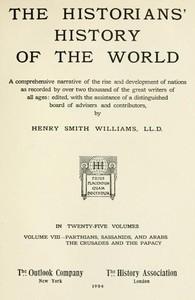Read this ebook for free! No credit card needed, absolutely nothing to pay.
Words: 73451 in 22 pages
This is an ebook sharing website. You can read the uploaded ebooks for free here. No credit cards needed, nothing to pay. If you want to own a digital copy of the ebook, or want to read offline with your favorite ebook-reader, then you can choose to buy and download the ebook.


: Greek Imperialism by Ferguson William Scott - Greece History; Imperialism; Greece Politics and government
GREEK IMPERIALISM
GREEK IMPERIALISM
IMPERIALISM AND THE CITY-STATE
It is my purpose in this opening chapter to define some terms which I shall have to use repeatedly in the book; to make a somewhat detailed examination of the character of the Greek states whose political integrity was threatened by imperialism; to trace the development of imperialism to its culmination in the divine monarchy of Alexander the Great and his successors; and, at the same time, to arrange a general political setting for the topics to be discussed in the six succeeding chapters.
An empire is a state formed by the rule of one state over other states. It is immaterial in this connection what form of government the ruling people prefers. Power may be exercised there by a monarchy, an oligarchy, or a majority without altering in any essential the relation of the sovereign to its dependencies. Still less does it matter whether the subject people is governed by the one, the few, or the many; for all kinds of governments may exist, and have existed, in dependencies.
Naturally, an empire is compatible with any kind of an administrative service among both governors and governed. The suzerain may attend to its affairs with the aid of professional and specially trained officials, as in a bureaucracy; and a vassal may entrust the details of its public business to successive fractions of its citizens, as in some republics: no imperial relation is established unless separate states or parts of states are involved. But when these are related in a whole as superiors and inferiors, an empire at once arises.
The relation of inferiority and superiority is, however, essential in any empire. In modern times this is acknowledged with the utmost frankness. Upon the higher capacity for government claimed by the Christian peoples, the Western cultures, or the Anglo-Saxons, as the case may be, modern pride, greed, or conscience bases its right to control inferior races. "Take up the white man's burden" is the modern substitute for the ancient commandment, "Go ye into all the world and preach the Gospel to every creature." The possession of a better rule of public life imposes--it is affirmed--a missionary obligation no less weighty than the possession of a special rule of eternal life.
Less exasperating, perhaps, than this assumption of moral and political superiority is the candid profession of the right of the stronger. The right of conquest gives a title which is valid in international law when every other right is lacking. When superiority is stipulated to be absent, the product is a federation or something similar from which the name empire is withheld. When, in course of time, superiority dies out till a common right eventually embraces subject and sovereign alike, a new state arises, to which, as in the case of the present-day British world, the title empire is applied with some impropriety.
The policy by which a people or an autocrat acquires and maintains an empire, we call imperialism. The term is, of course, a legacy from Rome--a mute witness to the peculiar importance of the Roman empire in the history of state-building. And, I suppose, it is the policy of Rome that we think of most instinctively when we allude to imperialism. This is by no means an accident. For not simply the type, but also many of the most noteworthy varieties of this kind of policy, are found in the experience of the Romans; and the course of political progress has been such that in the triumph of Rome imperialism reached its logical issue more closely than either before or since in the history of the world.
Transcendent as is the imperial achievement of the Romans, and unrivaled as is the political sagacity with which they consolidated their power and made it enduring, it must still be recognized that they were the heirs, in war, diplomacy, and government, of the Greeks, their predecessors. They worked with greater power and with larger units than did the Spartans and the Athenians. They benefited by the brilliant inventions and the costly errors of the Macedonians whose kingdoms they destroyed. But their success simply brought to a culmination the imperial movement in which Sparta, Athens, and Macedon were worthy co-workers. It is our task in this series of essays to examine in turn the imperial experiments by which the Greeks not only won a field for the display of their own talents, but also prepared the way for the unification of the ancient world in the empire of Rome.
The city enables men to co?perate easily. In it ideas and feelings spread quickly. Life, property, and privileges are there protected by walls, and, if need be, by street barricades. "Two voices are there," wrote Wordsworth in 1807, his vision limited by the peril of England and Switzerland,--
"one is of the sea, One of the mountains; each a mighty Voice: In both from age to age thou didst rejoice, They were thy chosen music, Liberty."
Free books android app tbrJar TBR JAR Read Free books online gutenberg
More posts by @FreeBooks


: The Historians' History of the World in Twenty-Five Volumes Volume 08 Parthians Sassanids and Arabs; The Crusades and the Papacy by Williams Henry Smith Editor - World history







